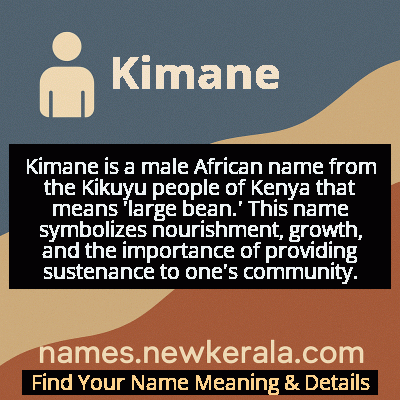Kimane Name Meaning & Details
Origin, Popularity, Numerology Analysis & Name Meaning of Kimane
Discover the origin, meaning, and cultural significance of the name KIMANE. Delve into its historical roots and explore the lasting impact it has had on communities and traditions.
Name
Kimane
Gender
Male
Origin
African
Lucky Number
8
Meaning of the Name - Kimane
Kimane is a male African name from the Kikuyu people of Kenya that means 'large bean.' This name symbolizes nourishment, growth, and the importance of providing sustenance to one's community.
Kimane - Complete Numerology Analysis
Your Numerology Number
Based on Pythagorean Numerology System
Ruling Planet
Saturn
Positive Nature
Ambitious, efficient, realistic, and authoritative.
Negative Traits
Materialistic, stressed, confrontational, and can be overly ambitious.
Lucky Colours
Dark blue, black.
Lucky Days
Saturday.
Lucky Stones
Blue sapphire, amethyst.
Harmony Numbers
2, 4, 6.
Best Suited Professions
Business leaders, managers, financial services, law enforcement.
What People Like About You
Leadership, determination, organizational skills.
Famous People Named Kimane
Kimani wa Nyoike
Traditional Elder and Community Leader
Renowned Kikuyu elder who preserved oral traditions and mediated community disputes
Kimani Maruge
Student and Symbol
Oldest primary school student in Kenya at age 84, became international symbol of education importance
Kimani Njogu
Academic and Cultural Researcher
Prominent scholar in African languages and cultural studies, preserving indigenous knowledge
Kimani Ichung'wah
Politician
Kenyan Member of Parliament known for advocacy in education and community development
Name Variations & International Equivalents
Click on blue names to explore their detailed meanings. Gray names with will be available soon.
Cultural & Historical Significance
Historically, the name Kimane would have been given to signify hope for a child who would grow strong and provide sustenance to their community, much like the nourishing bean. In Kikuyu cosmology, agricultural metaphors frequently appear in naming practices, connecting individuals to the land and traditional ways of life. The name also reflects the intergenerational transmission of cultural values, where elders bestow names that carry ancestral wisdom and community expectations.
The name serves as a living connection to Kikuyu identity and values, particularly important in modern times when cultural preservation faces challenges from globalization. It represents not just an individual identity but a continuum of cultural memory and agricultural heritage that has sustained the Kikuyu people for generations.
Extended Personality Analysis
Individuals named Kimane are often perceived as grounded, reliable, and nurturing—qualities that align with the name's agricultural origins. They tend to exhibit practical wisdom and a strong connection to their roots, often serving as stabilizing forces within their families and communities. Their personality typically combines traditional values with adaptive intelligence, allowing them to navigate both conventional and modern contexts with grace.
Kimane bearers are frequently described as patient and methodical in their approach to life's challenges, reflecting the gradual growth cycle of the bean plant. They often demonstrate strong community orientation, prioritizing collective wellbeing over individual ambition. Their inherent resilience enables them to thrive in various circumstances, much like the hardy bean plant that sustains itself through different seasons.
These individuals typically balance respect for tradition with forward-thinking perspectives, making them effective bridges between generations. They often display quiet confidence rather than overt assertiveness, and their strength lies in their consistency and dependability. The nurturing aspect of their personality manifests in their tendency to support others' growth and development, much like the bean that provides nourishment to sustain life.
Modern Usage & Popularity
In contemporary times, Kimane maintains its cultural relevance while adapting to modern naming practices. The name continues to be used within Kikuyu communities in Kenya and among the diaspora, serving as a meaningful connection to heritage. While not among the most common names statistically, it holds significant cultural weight and is often chosen by parents seeking to honor traditional values and agricultural heritage. The name has seen renewed interest as younger generations rediscover indigenous naming traditions and seek to preserve cultural identity in an increasingly globalized world. Urbanization and interethnic marriages have led to some adaptation of the name, but its core meaning and cultural significance remain intact among those who choose it deliberately.
Symbolic & Spiritual Meanings
Symbolically, Kimane represents nourishment, growth, and foundational strength. The 'large bean' metaphor extends beyond literal meaning to signify the bearer's potential to become a source of sustenance and stability for their community. It embodies the cycle of life, from planting to harvest, reflecting patience, gradual development, and eventual fruition. The name also symbolizes humility and earthiness, reminding the bearer of their connection to the land and the importance of remaining grounded despite personal achievements. In a broader sense, Kimane represents the idea that true value often comes from humble origins and that sustained growth requires both patience and resilience—qualities essential for both agricultural success and personal development.

